

In 1978, the NHL sent me to an International Ice Hockey Federation Referees clinic in Fussen, West Germany. We had referees there from all over the world, including Canada, the United States, the Soviet Union, Japan, and Australia. About twenty countries were represented. I was a “courtesy representative” sent to offer the viewpoint of an NHL referee to these top amateur referees. We all had a grand time sharing our various opinions on the art of officiating. On one occasion, I sided with the Eastern Bloc delegation during a rule interpretation, and my North American colleagues asked if I had family in the Soviet Union!
While at the clinic, I noted that the West German Hockey Federation ran a summer hockey school. I subsequently got myself hired as a hockey instructor and returned for three summers in beautiful Bavaria with my wife, Barb, daughter, Lisa, and son, Brian, who started in the school as a nine-year-old. I instructed at the hockey school along with European instructors who were very adept at the skills part of the game. My girls enjoyed hot fudge sundaes (and I think my teenage daughter chased after some of the hockey players). What a great spot! I also instructed at referee schools in Germany, Switzerland, and Italy, with my family coming along. We had a glorious time.
Some minor hockey coaches would think they invented the game; I used to call them “The Windbreaker Empire guys.” I recall helping out in the penalty timer’s area during one of my son’s games, when a fourteen-year-old referee was being verbally abused by an older coach — a so-called adult — who was banging his clipboard on the boards. I mentioned to the referee that he did not have to put up with this abuse, and the next time the coach banged the boards he was given a bench minor penalty. The coach knew I had put the referee up to making the call, and before the game was over, the coach threw his cowboy hat on the ice and was ejected from the game. The coach appealed the League’s disciplinary action, but it was subsequently confirmed. This incident reinforced why I am not fond of adults getting too involved with kid’s games.
I had done some lacrosse refereeing in the early 1970s and ended up as the general manager of the Canadian team that won the world championship in Field Lacrosse in 1978, in Stockport, England. So, in 1998, I was delighted when asked to become Director of Officiating for the newly formed National Lacrosse League. This indoor lacrosse league had several teams in the Eastern United States and the Toronto Rock Club in Canada.41 Both hockey and lacrosse are somewhat similar in their rules and the personalities that are involved in the game.
I ran the officiating end of things for over three years and enjoyed working with all the clubs and the referees, who were from both Canada and the United States. After a few years, I noticed that some of the new GMs and owners were all of a sudden starting to become experts on refereeing and were now trying to tell me who should be refereeing their games, and so on. I took exception to this, and, of course, the owners won and I was terminated. It was a good ride, though, and I met a lot of fine people.
In 1989, Ben Alaimo Junior, a young referee friend of mine, started a hockey tournament in Florida and he still runs it in various locations in both Canada and the United States. Teams come from all over the world, including Sweden and Russia, to play in friendly matches. We had a team of hotshots from North America playing a team of veteran Russian players, some of whom had played in the Olympics. The hotshots got a little cocky, and the Russians put them in their place in a hurry.
One of the more interesting of these friendly games occurred in Fort Lauderdale, when a team of French-Canadian expatriates living in Florida played a team of local U.S. players. The game got a bit nasty, and at the end of the game, when handshakes were taking place, one American player went directly off the ice. One of the expats asked him if he was not a good sport; the reply was that he would not shake hands with a “dirty frog.” So, of course, everyone went over the boards and fisticuffs were flying!
My wife, Barb, was standing near the boards wondering what all the commotion was about. We filled her in, and later that evening we held a reception at Ben’s apartment for all the players. Barb was the hostess. When the tough French guy showed up, she greeted him with, “How ya doing, froggie?” I damn near fell off the balcony. I must say Barb had guts! (They ended up dancing together before the night was over.)
I had been dating Barb for over two years and we got engaged at Christmas 1963. I received her mother’s blessing to take her on a “road trip” starting out on the train from Sudbury to Montreal, then into New York City for a few days between Christmas and New Year’s. We then trained it to Pittsburgh for New Year’s Eve, and I vividly recall Barb dancing with Gump Worsley, the visiting goalie, who was a couple of inches shorter than her.
After the game the next night, I was catching a train to St. Louis, and I put Barb on the overnight bus to Buffalo, connecting to Toronto, and eventually to Sudbury. This lovely bus trip usually took about eighteen hours in total, but Barb missed a connection in Buffalo and did not arrive in Sudbury until about midnight the next evening! It took her about twenty-four hours to get to Sudbury. It was the best thing that ever happened to our marriage, as she had lived in the shoes of a referee, and did not bug me about why I was always so tired when I limped in from a road trip.
After we were married, I took Barb to a game in Montreal, and following the game, she was outside the referees’ room waiting for me. League president Clarence Campbell sauntered by and asked her, “What are you doing here?” Barb said she waiting for her husband, and Mr. Campbell replied, “Who might that be?” Her response was, “Ron Wicks, the referee.” Mr. Campbell made no further comment but kept right on going. (Barb remembers the incident to this day!)
Mr. Campbell was a stern-looking individual who could inflict fear on young ladies hanging around dressing rooms. I guess he did not want his officials to be led astray by any nubile young ladies!
On Nov 22, 1963, as part of my refereeing apprenticeship I was sent to observe a game in the American Hockey League and was walking down the street in Springfield, Massachusetts, with my boss Carl Voss and fellow referee Bruce Hood, when a passerby mentioned that the U.S. president had been shot. We went into a bank and watched the bank’s ticker machine print out that President Kennedy had been gravely wounded in Dallas, Texas, and had been taken to hospital.
It was not until several hours later that it was confirmed he had passed away. The country and most of the world was in total shock. The idyllic Camelot scenes of Kennedy and his lovely wife, Jacqueline, were now over. This tragedy took the country years to recover from, and maybe it never has.
In the summer of 2001, I was hired as Director of Officiating by the National Lacrosse League, and had been commuting from my home in Brampton, Ontario, to the League office in New York City. I had made this trip several times. It was a lovely, early fall day on September 11, when my son, Brian, dropped me off at the Toronto airport to catch the 7:00 a.m. flight into Newark Airport, just a few miles from New York City.
The flight was uneventful and landed at about eight o’clock in the morning. I boarded the airport bus and was enjoying the drive from New Jersey into Manhattan Island, when suddenly all traffic on the roadways came to a complete stop. I was sitting up next to the bus driver, who was talking on his two-way radio. He was informed that all bridges and tunnels into Manhattan were closed because an airplane had crashed into one of the city’s skyscrapers. Traffic was chaotic. By this time we were in Hoboken, New Jersey, near the Lincoln Tunnel. I decided to hop off the bus and see if I could catch a ferry boat across the Hudson River into Manhattan. I was standing near a government building when a security guard suggested I move away from the building. When I asked why, he told me to look to my right, and I was shocked to see both buildings at the World Trade Center on fire. The guard’s eerie comment, “We are at war,” sticks with me to this day.
I spent several hours on the shore of the Hudson River watching people being evacuated from Manhattan on the ferry boats. Fortunately, I had a cell phone with me and called Barb at home. She had been out playing golf, but was brought in from the course because they were concerned for my safety, because two other hijacked planes had crashed at various places in the United States, namely the Pentagon and in Pennsylvania. I told her I was okay and would try to find my way home somehow. At about three p.m., buses showed up, and I was able to get to my hotel in New Jersey, where I spent a restless night, mainly looking out my hotel window, watching the Twin Towers burn in the distance. All flights in North America had been grounded by the government, and the next afternoon I decided to see if I could catch a train back to Canada. I took a taxi to Newark train station, caught the train into Manhattan, then connected by train to Albany, New York, and then on to Buffalo. Barb and Brian met me at the Tim Horton’s restaurant in Fort Erie, Ontario, at about four o’clock the next morning. (I had an appreciation of how soldiers felt upon returning home!)
One thing I noticed was that in spite of the terrible tragedy that had taken place, nobody in America appeared to panic. (I really feel the country was in shock.) The buses and the trains were orderly; the only difference I saw was when I was at the border crossing from the United States back into Canada, there were U.S. Marines performing security checks with rifles at the ready. I knew right then our peaceful society would never be the same. And it hasn’t been.
I asked Barb to tell a bit about her side of the story:
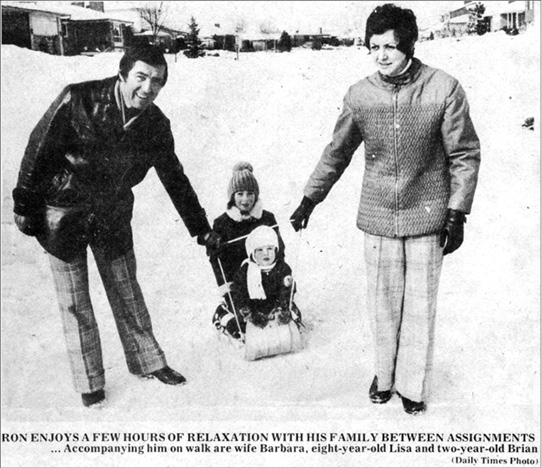
Ron, Lisa, Brian, and Barb out in the snow.
Brampton Daily Times
Life as a referee’s wife was a good one, although lonely at times. Unlike hockey players’ wives who had each other for company, we were spread out in different cities and did not spend much time together while our husbands were on road trips, which could be anywhere from a few days to several weeks at a time.
Like anyone else, we got involved in other things to keep busy. One day, Ron came home and told me he had registered me at the local curling club. I wasn’t athletic and didn’t think I would be interested in curling. Well, that was more than thirty years ago, and I’m still curling. I attended exercise classes on a regular basis and also made many new friends.
Our two children, Lisa and Brian, were a big part of my life. They were very active in sports, and, like all moms, I was busy transporting them to their various activities and, again, meeting other new people. One day, Brian’s teacher asked him if I was a young or old mother (what a question!). Brian answered that I was middle-aged. That didn’t please me! He has always had some of his father’s entrepreneurial spirit in him, and that came out at an early age when I discovered he had been selling my wonderful veal sandwiches to his school friends in order to buy greasy hamburgers. He once went up and down our street selling old pucks, skate laces, and gum that he got out of Ron’s referee’s bag. He had made up a Vegas-style cigarette display container and tied it around his neck to showcase his products.
And, while I think of it, our daughter, Lisa, was tarred with a little of the same brush. We bought her a car for her out-of-town university, and I lent her my credit card for gas (what was I thinking!) only to find that she had returned to Brampton to visit her new boyfriend one weekend (and did not call me). Then, to compound matters, she filled his car up with gas! Fortunately, it all stayed in the family, as the new boyfriend, Adrian, became her husband.
There were times as a ref’s wife when you had to be tough-skinned. People were fans and had their favourite teams, and when Ron’s call went against their team I often heard about it. As time went on, I tried not to let these issues bother me. One night, after Ron had refereed a Maple Leafs game, I received a late-night phone call from a stranger only to hear him call my husband terrible names. This I found quite disturbing, especially when I was at home alone with my children.
I looked forward to spring when we could all be together as a “real family.” By summer’s end, however, I was as ready as Ron to see the hockey season start, so I could get on with my other life.
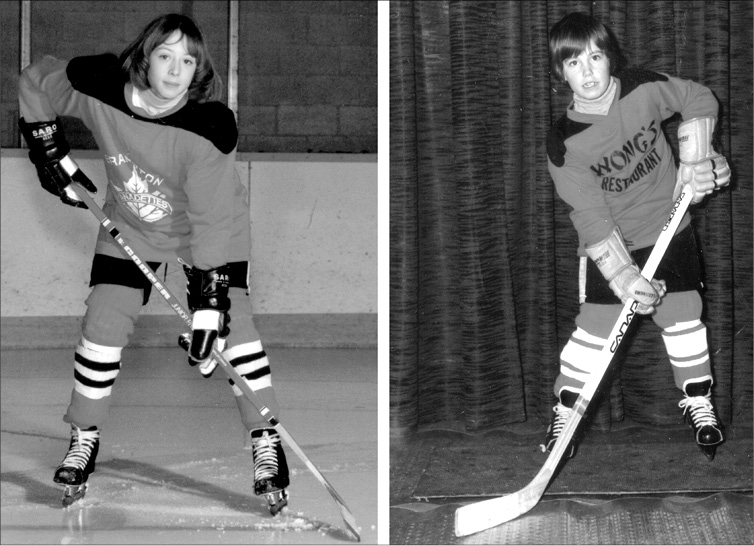
Left: Lisa, ca. 1978. Right: Brian, ca. 1982.
Author’s Collection
I enjoy the game of golf, although I find it challenging and, at times, a bit frustrating. I have been known to say, “I am living proof one does not have to have a hell of a lot of talent to play the game.” Several years ago, in a newspaper article, I mentioned I had received most of my “golf tips” from both my pro golfer pal Bobby Breen and former NHL star and now golf teacher Andy Bathgate. Within hours, I had a phone call from each of them disclaiming any responsibility for my golf “skills.” Bobby has a pet saying: “You are not that good, to complain that much.” He has dropped this little ditty onto our opponents on the golf course, generally getting their attention!
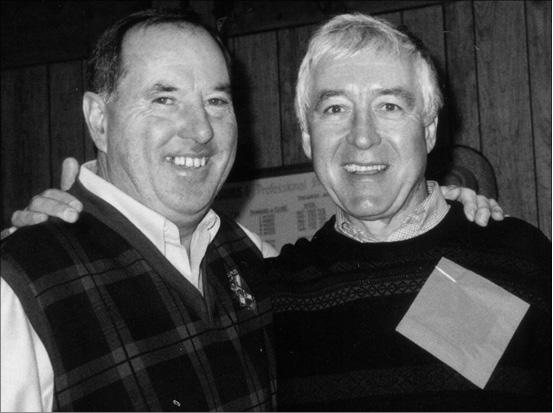
Bobby Breen and Ron, “My golfing guru.”
Author’s Collection
I have mentioned that I have been fortunate to be able to participate in numerous charity golf tournaments all over North America. You really get to know a person on the golf course. Recently, I was playing with my pal “Buzz.” He was beating me and needled me about my lack of athleticism. Several holes later, I came back and tied our game up, and then my “superior conditioning” kicked in and I won our little match. I also enjoyed the cold beer that went to the victor!
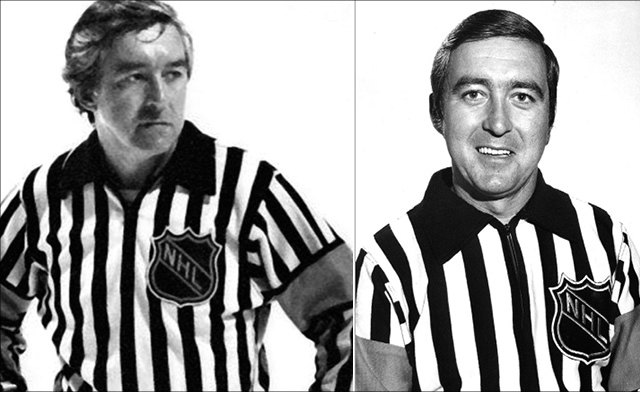
Left: Ron, during a game, ca. 1980. Right: Ron, 1980s.
Author’s Collection
When often asked what makes a good referee, the term “acceptability” comes to mind. You can have all the talent in the world, but if you are not accepted by the players, coaches, clubs, and your peers, you won’t last! It’s an intangible ingredient.
I’ve always tried to keep things low-key with the players; exchanging a laugh or even a smile with them is better than confrontations. You can’t carry things over from one game to the next; you must clean the slate and move on.
An article in the Hockey News, in 1983, sums up how I feel about the job of refereeing. It was part of a conversation with Stan Fischler, the dean of the New York hockey writers and noted referee baiter, who allowed several referees equal time.
In it I was quoted as saying: “A referee has to be an athlete who is also a judge; and we are travelling at twenty-five miles an hour on the ice while we are doing it. We see most everything on the ice. It’s how we react to it that causes controversy. Determining whether an aggressive bodycheck is a foul or a legitimate play is not always easy.”
Coaches, managers, and media people always zinged us for being inconsistent, but our collective retort was that we have to start the game being perfect, and then get better as the game goes along! Most referees feel that in their heart they have never called a bad one. In fact, former referee King Clancy used to say that when he skated onto the ice, he was the only sane person in the rink.
As for consistency, I always felt that you had to trust your judgment, and can’t copy another referee. The players got used to your style and knew what to expect from you; they could always sense when a referee was losing control of the game. Then, the inmates would take control of the asylum! Some nights we came close to losing that control, but for the most part we were fortunate to get most games over without civil insurrection breaking out! The advent of the two-man referee system, however, has made many of these philosophies of refereeing redundant.
Most of us played professional hockey and refereed for the money and the fun of it, and pensions did not appear to be that important — until we stopped playing. I gather I was a bit different, as the first time I paid any attention to pensions was in 1962, when I worked my first all-star game and realized that the linesmen were the only two guys on the ice who were not benefiting from the NHL pension plan contributions that came from the game. Generally speaking, though, we all had a sense of entitlement, a feeling that when we retired, the League would take care of us. Little did we know . . . ?
Pensions have long been a bone of contention, both with hockey players and the officiating staff. In their book, Net Worth, David Cruise and Alison Griffiths talk about “the shocking story of abuse that goes back decades . . .” and continues to this day, including, “All-star players who find that their much-lauded pension plan doesn’t pay them enough to live on after retirement.” A group of about fifty Oldtimers (including Bruce Hood and me, representing referees) got together in 1990 and the players decided to sue the NHL clubs and the League’s pension society for pension monies that they felt were owed them. In 1993, Ontario Judge George Adams found the League had appropriated surplus cash that should have remained in the pension fund. The clubs had to restore fifty million to the pension fund and they agreed to restore five million to the referees’ fund.42
There continue to be problems with the underfunded pension plan. In a ruling of June 18, 2009, an Ontario Superior Court Judge found that the NHL has been underfunding its players’ pension fund. This means the NHL will have to top up its pension fund by as much as thirty million dollars.
It was found that errors in the calculations of pensions for players who died before 1986 meant that their widows were receiving as little as 10 percent of the funds entitled to them. Approximately sixty widows will receive increased pension payments and may be entitled to a retroactive payment.
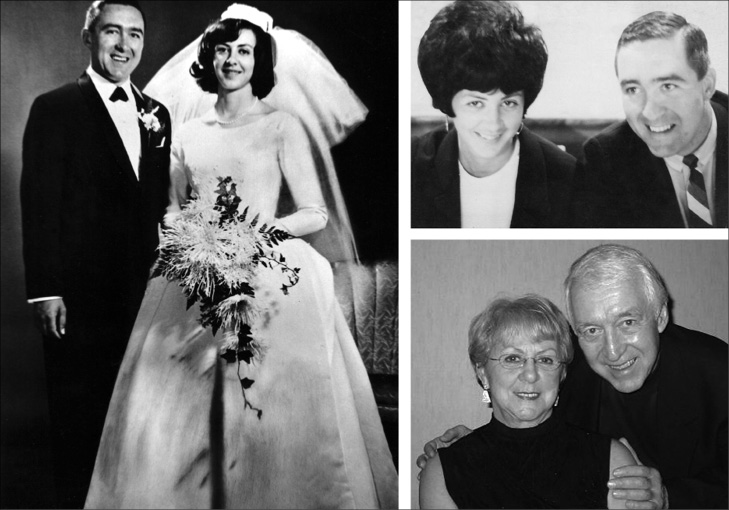
Left: Barb and Ron on their wedding day, 1964,
Top right: Barb and Ron, then, ca. 1962.
Bottom right: Barb and Ron, now.
Author’s Collection
In the matter of wives — the only reason I survived over twenty-five years in professional hockey, is because Barb is such a great wife and mother. Any athlete must have a spouse who can take charge of things at home while the athlete is away on the road, and I am truly indebted to her for “steering the ship” along some of the rocky roads that ultimately take place over a lengthy career. My dad, Charlie, tried to discourage her from dating a referee. He figured she would derail my career, but our marriage has lasted for over forty-five years. Barb even moved our family from Sudbury to Brampton, Ontario, in November of 1968 while I was on a road trip. I still don’t know how to turn the furnace thermostat down; so that shows you the value of a good wife.
I know my children missed having me around at times, but they were also just a bit proud to watch their dad on TV, refereeing NHL games. At times they caught the verbal brunt of comments, especially when the Maple Leafs lost (which happened with great regularity — although I hear this is the year!). Lisa and her husband, Adrian, have blessed us with a lovely granddaughter, Nyah, who is a superb pianist and is now taking up golf.
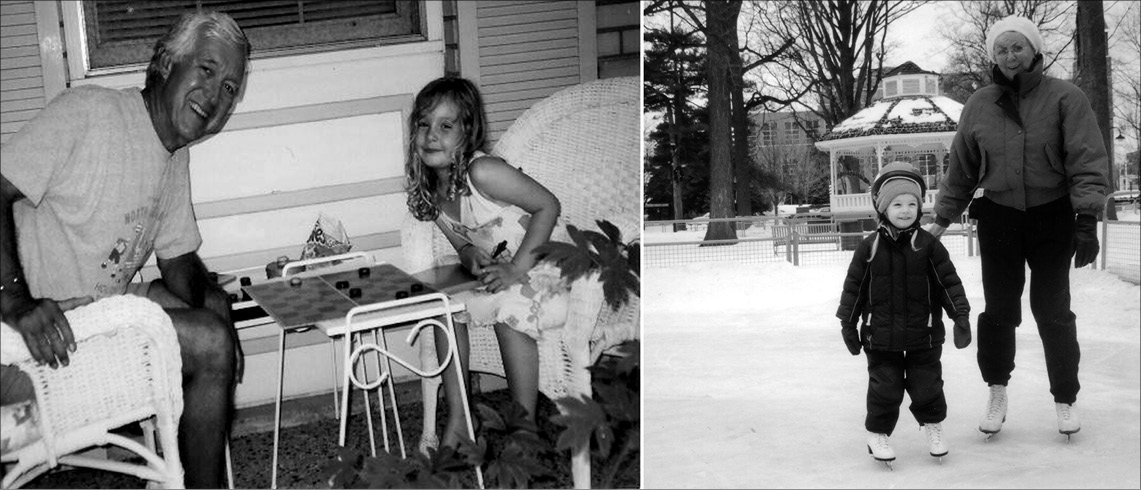
Left: Ron and granddaughter, Nyah.
Right: Nyah and Noni (Barb), Gage
Park.
Author’s Collection
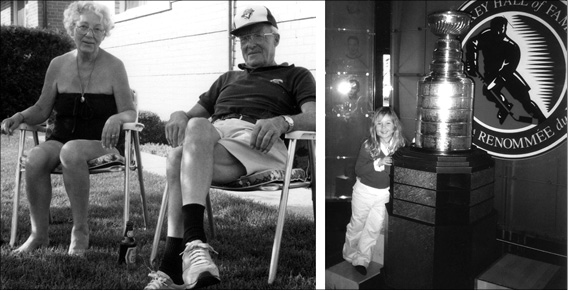
Left: Ron’s mother and father, ca. 1990.
Right: Nyah and the Stanley Cup.
Author’s Collection
My son, Brian, is a good athlete, a fine hockey player, and loves golf. (That’s what he told one of our club’s top golfers when he was ten years old, and was asked whether or not he liked golf.) Brian has been a musician since about three years old. He has written several records. He recently dedicated one, affectionately, to his mother, called Nag! He is a very urbane young man.43
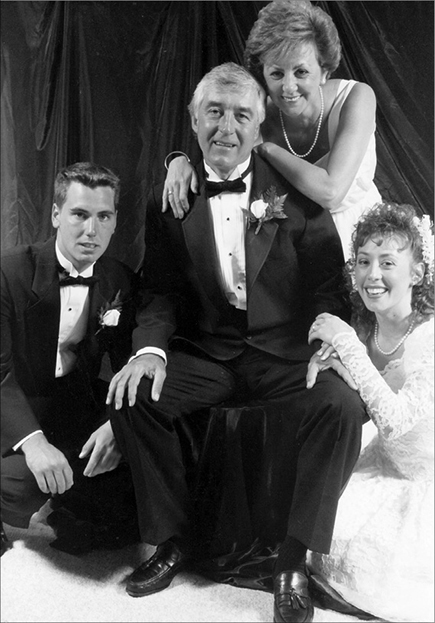
Brian, Ron, Barb, and Lisa on her wedding day, 1992.
Author’s Collection
I was fortunate to have been raised by wonderful, caring parents, and my dad, Charlie, was probably the most positive influence in my life. When people asked him how he was feeling, even at ninety years old he would reply, “I’m fine, thank you. How are you doing?”
I try to carry over this attitude into my everyday life. I work out most mornings at my local YMCA then off to my real estate office for a few hours, and if the weather is decent I try to “hit a few” at the Brampton Golf Club where Barb and I are members.
In the winter, the joy of skating outdoors on Rotary Trail at Gage Park in Brampton, on a cold sunny day in December, takes me back about sixty years to when I was skating on my school’s outdoor rink in Northern Ontario. The feeling of exhilaration is still the same. The sun and wind in your face helps remove all the challenges that are sent to test us.
Try to stay happy. It is a wonderful world! Thanks for joining me in my skate around the rinks . . .
41 Indoor lacrosse is a hybrid sport made up of some of the best qualities of the Canadian box game and the American field game. It is an exciting game to play and watch. Numerous Canadian box players have attended U.S. colleges on field lacrosse scholarships.
42 Toronto Globe and Mail, Thursday, June 25, 2009.
43 Brian recently called his mom from a noisy pub to wish her a happy birthday — at 1:30 a.m., waking our entire household. Barb returned the favour at 6:30 the next morning by waking him up! Barb would have made a good referee — don’t get mad, just get even.